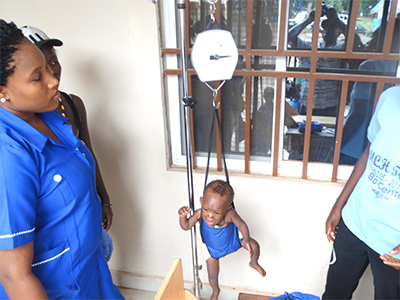Once every month, staff from the United Methodist Mercy Hospital's (Advance #15173A) trek to hard-to-reach communities to provide free treatment. At other times, the outreach team invites people to visit the hospital for treatment at no cost. The United Methodist Board of Global Ministries helps support the hospital through its Advance program.
This United Methodist hospital's outreach program is transforming the lives of the poorest of the poor in Sierra Leone.
The program targets pregnant women, nursing mothers and children under 5 years old in remote communities where availability of health care and the ability to pay is a challenge.
Pregnant women visiting for the first time receive long-lasting insecticide-treated nets to help them avoid mosquito bites while sleeping at night.
"We test pregnant women for malaria, syphilis and HIV ... Positive HIV cases are put on medication to prevent mother-to-child transmission. Partners of positive cases are encouraged to do testing," said Mohamed Khadar, outreach manager for the hospital.
Kadar said the outreach is making a difference in people's lives.
He cites the case of "Baby Betty," an infant from a Tikonko village who was severely malnourished when she came for treatment at 16 months old.
"She was sick with severe acute respiratory infections, was coughing severely and also had pneumonia. We treated her and put her on special diet," Kadar said. "She is now over 2 years old and looks very healthy."
 |
| Staff at United Methodist Mercy Hospital in Bo, Sierra Leone, weigh a child during one of the hospital's outreach days on the hospital grounds. Photo by Phileas Jusu, UMNS. |
Mamie Kabba, from another Tikonko village, was 7 months old when the team met her.
"She, too, was completely malnourished but now is very healthy (at 2 years old)," Khadar said.
Augusta Kpanabum, chief nurse at Mercy Hospital, said the outreach team travels to remote areas to reach those most in need.
Kpanabum said the outreach works to minimize cases of maternal and infant mortality rates in the deprived communities.
While the team is making inroads in care, they still face challenges, including issues with mobility, Khadar said.
Meanwhile, the Mercy team is seeing an increase in HIV infection in the Bo district.
However, Mohamed Koroma, Mercy Hospital HIV coordinator, said the increase is likely due to the team's vigilance in the communities and awareness efforts.
"The figures might not be practically going up but more tests are now being done, which unveil the true figures that have been lurking in the dark," he said.
"People now have more access to information. We're reaching out more into the communities and hence discovering more. Also, our care and treatment of HIV patients is encouraging more people to come and know their status."
Khadar emphasized that Mercy Hospital is intensifying voluntary counseling and testing while encouraging the infected to bring in their partners for testing. The team is also expanding HIV education with a focus on putting an end to bad traditional practices that promote the spilling of blood.
Phileas Jusu, director of communications for The United Methodist Church in Sierra Leone.
The Advance is the accountable, designated-giving arm of The United Methodist Church. The Advance invites contributors to designate support for projects related to the General Board of Global Ministries. Individuals, local churches, organizations, districts and annual conferences may donate to The Advance. One hundred percent of every gift to The Advance goes to the project selected by the giver. Gifts to missionaries support the entire missionary community.





